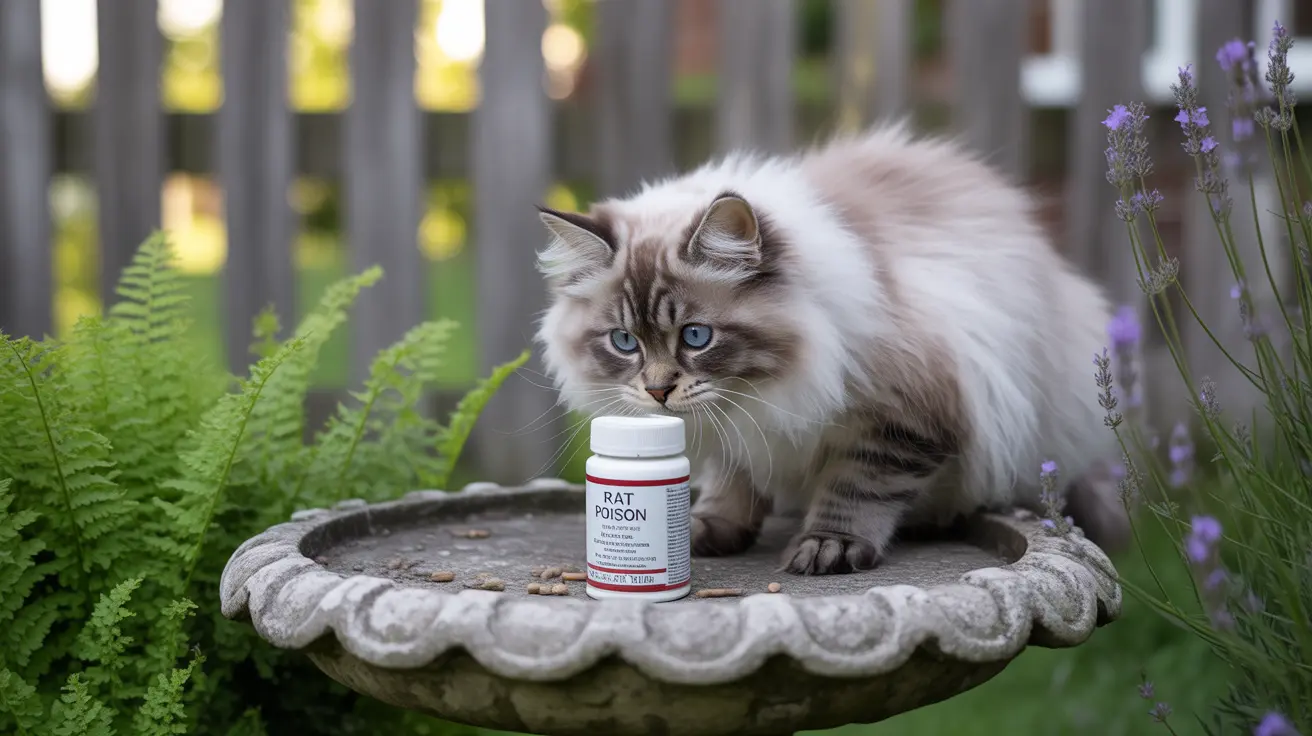Understanding the Dangers of Rat Poison to Cats
Cats face serious health risks when they encounter rat poison, whether through direct consumption or by eating poisoned rodents. As natural hunters, cats may be attracted to both the poison bait itself and any affected prey, making them particularly vulnerable to toxic exposure.
This comprehensive guide will explore the dangers of rat poison to cats, symptoms to watch for, and critical steps to take if you suspect your cat has been exposed to rodenticides. Understanding these risks could save your cat's life.
Direct and Secondary Poisoning Risks
Cats can be poisoned in two primary ways: direct ingestion of rat poison (primary poisoning) or by consuming poisoned rodents (secondary poisoning). Even a small amount of rodenticide can be lethal to cats due to their smaller size and unique metabolism.
Secondary poisoning is particularly dangerous because cats may hunt and eat poisoned rodents far from home, making it difficult for owners to know their pet has been exposed until symptoms appear.
Common Types of Rat Poison and Their Effects
Anticoagulant Rodenticides
These common rat poisons prevent blood clotting by blocking vitamin K absorption. Effects include:
- Internal bleeding
- Visible bruising
- Blood in urine or stool
- Weakness and lethargy
Neurotoxic Poisons
These types affect the nervous system and can cause:
- Seizures
- Muscle tremors
- Paralysis
- Respiratory failure
Recognizing Symptoms of Rat Poison Ingestion
Early detection is crucial for survival. Watch for these warning signs:
- Pale or blue-tinted gums
- Difficulty breathing
- Vomiting (possibly containing blood)
- Unexplained bruising
- Loss of appetite
- Excessive thirst
- Lethargy or weakness
Emergency Response and Treatment
If you suspect your cat has ingested rat poison or a poisoned rodent, immediate veterinary care is essential. Do not wait for symptoms to appear, as this could reduce the chance of successful treatment.
Treatment options may include:
- Vitamin K1 therapy for anticoagulant poisoning
- Activated charcoal administration
- Supportive care and fluid therapy
- Specific antidotes based on poison type
Prevention Strategies
Protect your cat by implementing these preventive measures:
- Never use rat poison in homes with pets
- Choose pet-safe pest control alternatives
- Keep cats indoors or supervised outdoors
- Regularly inspect your property for signs of rodenticide use
- Maintain current contact information for emergency veterinary care
Frequently Asked Questions
Can cats eat rat poison directly or by eating poisoned rodents, and what are the risks?
Yes, cats can be poisoned both ways. Direct consumption of rat poison is immediately dangerous, while eating poisoned rodents (secondary poisoning) can be equally lethal but harder to detect initially.
What symptoms indicate that my cat might be poisoned by rat bait?
Key symptoms include bleeding (internal or external), bruising, pale gums, difficulty breathing, vomiting, seizures, and unusual lethargy. Any sudden changes in behavior should prompt immediate veterinary attention.
How does secondary poisoning occur in cats from eating poisoned rats or mice?
Secondary poisoning happens when cats eat rodents that have consumed rat poison. The toxins remain active in the rodent's body and can affect the cat that eats it, potentially causing severe illness or death.
What should I do if I suspect my cat has ingested rat poison or a poisoned rodent?
Seek emergency veterinary care immediately. Don't wait for symptoms to appear. If possible, bring the poison packaging or dead rodent to help identify the type of toxin involved.
How can I prevent my cat from being exposed to rat poison and related health dangers?
Avoid using rat poisons in and around your home, keep cats indoors when possible, use pet-safe pest control methods, and regularly check your property for signs of rodenticide use by neighbors or pest control services.






